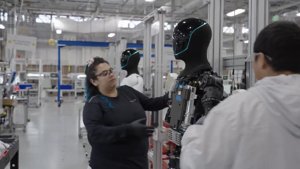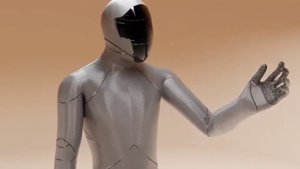Overview
In the bustling, often bombastic circus of humanoid robotics, where flashy demos and billionaire bluster dominate the headlines, a Norwegian outfit named 1X Technologies has opted for a decidedly more Scandinavian approach: quiet, methodical, and, frankly, rather sensible – which, in this game, is almost unsettling. Previously known as Halodi Robotics, 1X is on a mission to usher androids into the workforce and, eventually, perch them quite comfortably in your living room. Their secret sauce? A hefty dollop of pragmatism, seasoned with the formidable backing of AI titan OpenAI.
While rivals are busy teaching their bipedal bots to perform increasingly elaborate party tricks, 1X has been quietly deploying its wheeled android, EVE, into the gritty, unpredictable trenches of real-world logistics and security. This rather cunning, iterative strategy provides not just invaluable data, but, one presumes, a rather tidy bit of revenue too. Now, they’re channelling that hard-won experience into NEO, a bipedal home robot designed to be as safe and approachable as, well, a particularly cuddly piece of IKEA flat-pack. 1X isn’t merely cobbling together a robot; it’s meticulously constructing a compelling argument for a future where androids are as ubiquitous as a kettle, and it’s doing so one eminently sensible step at a time. The million-dollar question, of course, is whether this slow-and-steady approach can truly win the race against the flashier, faster-moving juggernauts of the robotics world.

Key Points
- Founded: 2014 in Stavanger, Norway, originally as Halodi Robotics.
- Leadership: Helmed by CEO and co-founder Bernt Øivind Børnich.
- Primary Focus: Developing and deploying general-purpose androids for commercial and domestic use.
- Key Products: The wheeled EVE android for commercial tasks and the forthcoming bipedal NEO android for home and retail environments.
- Core Technology: A proprietary “embodied AI” platform that allows robots to learn from human demonstration, powered by large-scale data gathering from their EVE fleet.
- Major Backing: Secured a $23.5 million Series A led by the OpenAI Startup Fund in March 2023, followed by a massive $100 million Series B in early 2024.
- Differentiator: A focus on inherent safety through compliant, soft-bodied hardware and a data-driven approach to AI development, starting with commercially viable wheeled robots before tackling the bipedal challenge.
Analysis
History and Evolution
Before it was the sleek, OpenAI-backed 1X we see today, the company was Halodi Robotics, founded in 2014. This history is absolutely crucial because it informs their entire strategy. Instead of immediately chasing the bipedal holy grail, they developed EVE, an android on wheels. This was a stroke of pure genius, born of pragmatism. A wheeled platform neatly sidesteps the rather thorny, near-insurmountable challenges of dynamic bipedal locomotion, allowing the company to focus on manipulation, navigation, and AI. By deploying EVE units as security guards and logistics helpers, 1X created a fleet of data-gathering machines, learning from the untidy, utterly unpredictable real world while their flashier rivals were still faffing about in the lab. The rebranding to 1X signalled a new stratum of ambition, supercharged by OpenAI’s rather hefty investment, to leverage this foundation for the next giant leap: a genuine bipedal android for the home.
Leadership and Technology
At the helm is Bernt Øivind Børnich, a CEO who appears far more invested in untangling knotty engineering problems than in generating media hoopla. This admirable ethos is, quite naturally, reflected in the very fabric of the company’s technology. The core of 1X’s approach is what they rather cleverly call “embodied AI.” They use a telepresence system where human operators control EVE robots, performing tasks like sorting boxes or patrolling warehouses. The robots’ onboard systems watch, learn, and gradually build autonomous capabilities from this human-provided data.
The partnership with OpenAI is the potent force multiplier here. While 1X provides the body and the real-world data, OpenAI provides the cutting-edge AI models to make some profound sense of it all. This rather elegant, symbiotic relationship allows 1X’s androids to gallop beyond mere pre-programmed routines and cultivate a truly generalised understanding of tasks. It’s a powerful combination that gives them a rather significant leg-up in the frantic race to forge a robotic brain that can actually function beyond the pristine confines of a controlled demo.
Market Position
The humanoid robot market is a veritable circus of titanic names and even more outlandish claims. You have Tesla’s Optimus, of course, backed by Elon Musk’s formidable manufacturing might and his rather notorious penchant for audacious timelines. Then there’s Figure AI, another OpenAI-blessed contender, which has rather wowed the crowds with its blistering progress and strategic partnerships. Agility Robotics, meanwhile, is already putting its bipedal bot, Digit, through its paces in the rough-and-tumble of actual warehouses.
Amidst this glorious chaos, 1X remains the quiet, unassuming contender. Their unique selling proposition is a proven, data-driven pathway to true autonomy. While others show off flashy, often-staged, one-off demos, 1X can point to a fleet of EVEs that have been diligently toiling away 24/7 for years on end. Their design philosophy for NEO also sets them apart. Its soft, fabric-swathed body and minimalist visage are deliberately crafted to be utterly non-threatening – the sort of robot you wouldn’t mind having potter about near your little ones, as opposed to a skeletal contraption that looks suspiciously like it’s a mere software glitch away from reenacting a particularly grim sci-fi horror flick.
Verdict
In a field seemingly defined by sheer spectacle, 1X Technologies manages to stand out precisely because of its refreshing lack of it. Their strategy of starting with a practical, wheeled robot to build a robust data pipeline and AI foundation is not just smart; it’s a blueprint, dare I say, for how to forge a truly sustainable robotics company. The design of NEO, which prioritises psychological safety every bit as much as mere physical safety, demonstrating a rather profound understanding of the genuine barriers to inviting androids into our daily lives. With OpenAI’s formidable brainpower and a grounded, iterative hardware roadmap, 1X appears to have assembled all the right pieces of the puzzle.
However, the chasm between a sturdy wheeled logistics bot and a fully-fledged bipedal butler is not merely vast; it’s practically a graveyard littered with the skeletal remains of countless failed robotics ventures. The sheer dexterity, the exquisite balance, and the nuanced common-sense reasoning demanded of a home robot are orders of magnitude more complex than simply patrolling a warehouse. While their data-first approach is sound, they are still competing against companies with immense resources and a rather alarming tolerance for incinerating cash at a truly spectacular rate. The market, bless its impatient heart, may not be inclined to wait for the slow-and-steady tortoise to finally mosey across the finish line.
Ultimately, 1X is betting that the secret to clinching the android race isn’t about being the fastest or the strongest, but the smartest and, crucially, the safest. NEO presents itself less as a technological brute and more as a gentle, unassuming companion, designed to seamlessly integrate rather than outright intimidate. If they can pull this off – and that’s a rather substantial ‘if’ – they won’t just be flogging a product; they’ll have forged the very first android that people might actually, genuinely want to welcome into their homes. But for now, it remains a beautifully designed promise, patiently waiting to prove it can do the washing up without smashing all the crockery.





